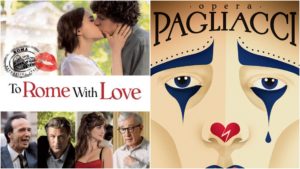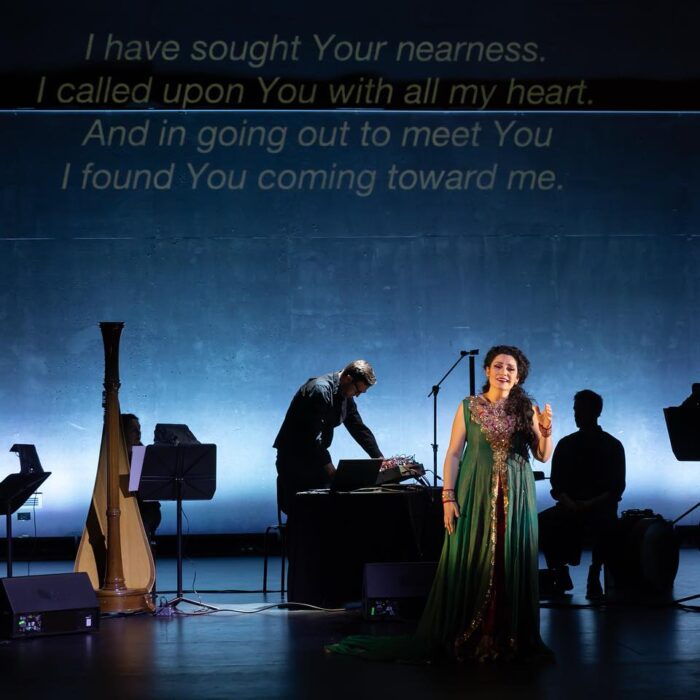
Opera Meets Film: A Look At Dreams Through Opera In ‘To Rome With Love’
By Francisco Salazar“Opera Meets Film” is a feature dedicated to exploring the way that opera has been employed in cinema. We will select a section or a film in its entirety, highlighting the impact that utilizing the operatic form or sections from an opera can alter our perception of a film that we are viewing. This week’s installment we will take a look at “To Rome With Love.”
“To Rome with Love” deals with fantasies, dreams, and love. It deals with characters who live unsatisfied in their daily lives and who dream with bigger and better things.
Like “Midnight in Paris,” Woody Allen uses the background of a legendary European city to showcase the mystic and romanticism one generally thinks about within one of these locales.
However, whereas “Midnight” took on one main narrative, this film features four stories. There is the architect who looks to a wild adventure with his girlfriend’s best friend and then there’s the ordinary Italian who lives a routine life with his wife and children and seeks to have more attention. There is also an Italian couple on their honeymoon seeking a better life in Rome and, finally, there is the American and the Italian who meet and fall in love and whose parents meet when they become engaged.
This last story is the one we will focus on as it summarizes the entire film of people seeking to live out their big dreams and fantasies. And in this story, we see one of the characters attempting to live out his dream by discovering a big opera singer.
A Dream
When we think of opera, we think of larger than life divas and singers with powerful voices. There is a divinity that has been bestowed on these singers and an intense pressure that is given to them. We seek perfection and yet they are human. There is also this romantic aspect to opera that is inherent to the art form and which gives it a fantastical element.
And with all performing arts, there are dreams of becoming the best and making a mark. But not everyone is born to be in show business. Some people fulfill these dreams of performing in the shower. They sing for themselves to relieve stress or simply fantasize about singing but that is not what they want. They simply love listening and singing along.
In the case of Giancarlo, Michelangelo’s father, he has a beautiful operatic voice that works only in the shower. When Jerry, Hayley’s father discovers the voice, he sets out to convince Giancarlo to give show business a try.
As he notes at the beginning of the film, Jerry never made his mark as an opera director and never achieved what he wanted. He always believed he was ahead of his time. So when he discovers Giancarlo singing in the shower, he immediately sets up an audition but that is a complete disaster as Giancarlo is unable to sing “Nessun Dorma” as well as he does in the shower.
And this is when Jerry decides to place Giancarlo in the shower during live performances. Jerry is seeking to live out his dream of making a mark using an art form that is considered traditional and old. He is trying to force a revolution by creating a sensation. And while Giancarlo fulfills his dream of performing “Pagliacci” and receives rave reviews, Jerry ultimately fails with critical scorn.
And this is ultimately how most of these stories end. While the characters seek out larger than life circumstances, they ultimately go back to their ordinary lives realizing that they can be perfectly fine the way they live.
Opera
Throughout the film, Allen chooses numerous operatic selections including “Nessun Dorma” and selections of “Pagliacci.” The “Nessun Dorma” is interesting as it used for Giancarlo’s audition. This is an aria that ends in triumph and is generally an audience pleaser. But Allen subverts the idea and shows Giancarlo fail as he cracks on the “vincero.” It is literally a failure rather than a victory.
And the Pagliacci is also interesting as it deals with show business. Canio is attempting to live a happy life with Nedda as he goes through the obstacles of his career. Throughout the scene where Giancarlo is performing “Pagliacci” in the shower, there are three portions of the opera that are clearly intentional in the film. The first is the opening when Canio tells the crowds that they will be giving a show, “a ventitre ore,” the show being Giancarlo in the shower performing as Jerry’s experiment. Then there is “Vesti la giubba” which is a display of a man suffering but having to continue the show regardless of his personal life. And the end is the death scene when Canio says “la comedia e finita,” the comedy is over. These lines end the show but in the film it also means that Giancarlo is done with Jerry’s experiment and his farce.
An Unexpected Opera Singer
Allen is also clever as he uses an actual opera singer to play Giancarlo. Fabio Armiliato, one of Italy’s most popular tenors, lets go of the glamour and elegance in favor of an ordinary look. And in doing so Allen subverts any notion of what opera singers look like and auras they have obtained.


